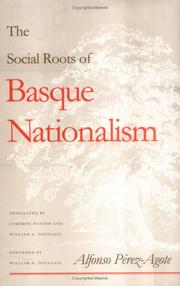| Listing 1 - 1 of 1 |
Sort by
|

ISBN: 0874176654 9780874176650 0874176050 9780874176056 Year: 2006 Publisher: Reno University of Nevada Press
Abstract | Keywords | Export | Availability | Bookmark
 Loading...
Loading...Choose an application
- Reference Manager
- EndNote
- RefWorks (Direct export to RefWorks)
"In The Social Roots of Basque Nationalism, sociologist Alfonso-Perez-Agote addresses the social mechanisms that Basques employed to sustain their ethnic identity under the Franco Regime and demonstrates how persecution actually encouraged the extension of Basque nationalist consciousness. He also reveals how state political pressure radicalized one element of the Basque-nationalist movement, resulting in the formation of ETA, an armed terrorist wing that itself became a mechanism for extending nationalist consciousness. Finally, he examines the subsequent changes in Basque nationalism following Franco's death and the extension of democracy in Spain, which resulted in the institutionalization of the movement into an autonomous political power." This work is based in part on a wide range of interviews and polls with informants in the Basque Country and abroad, eliciting such data as the role that family, education, social contacts, and religious environment play in the evolution of political attitudes; the place of violence in the Basque worldview and contemporary political culture; regional variations in Basque nationalism; and the factors that contributed to the resilience of Basque nationalism in adapting to new historical conditions. The result is a discussion of the various ways in which Basque social reality is constituted and how this reality helps to create political culture.
Nationalism --- Political persecution --- Basques --- Biscayans --- Vasques --- Vizcayans --- Ethnology --- Iberians --- Celtiberi --- Political repression --- Repression, Political --- Persecution --- Civil rights --- History --- Ethnic identity. --- Social life and customs --- País Vasco (Spain) --- Spain --- Politics and government --- País Vasco (Spain)
| Listing 1 - 1 of 1 |
Sort by
|

 Search
Search Feedback
Feedback About UniCat
About UniCat  Help
Help News
News